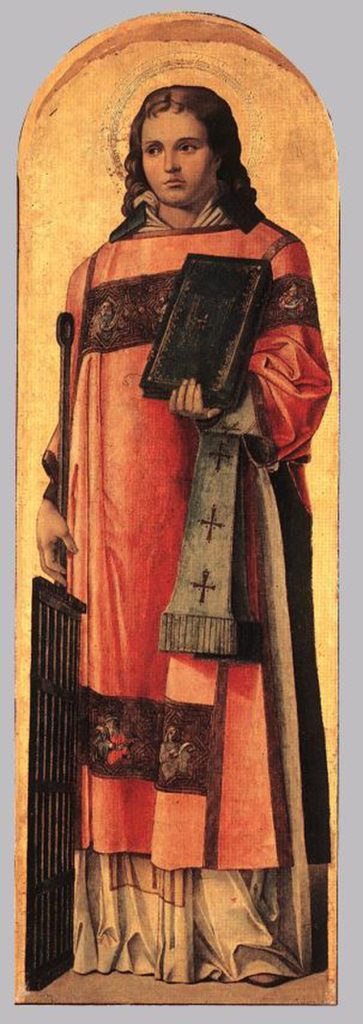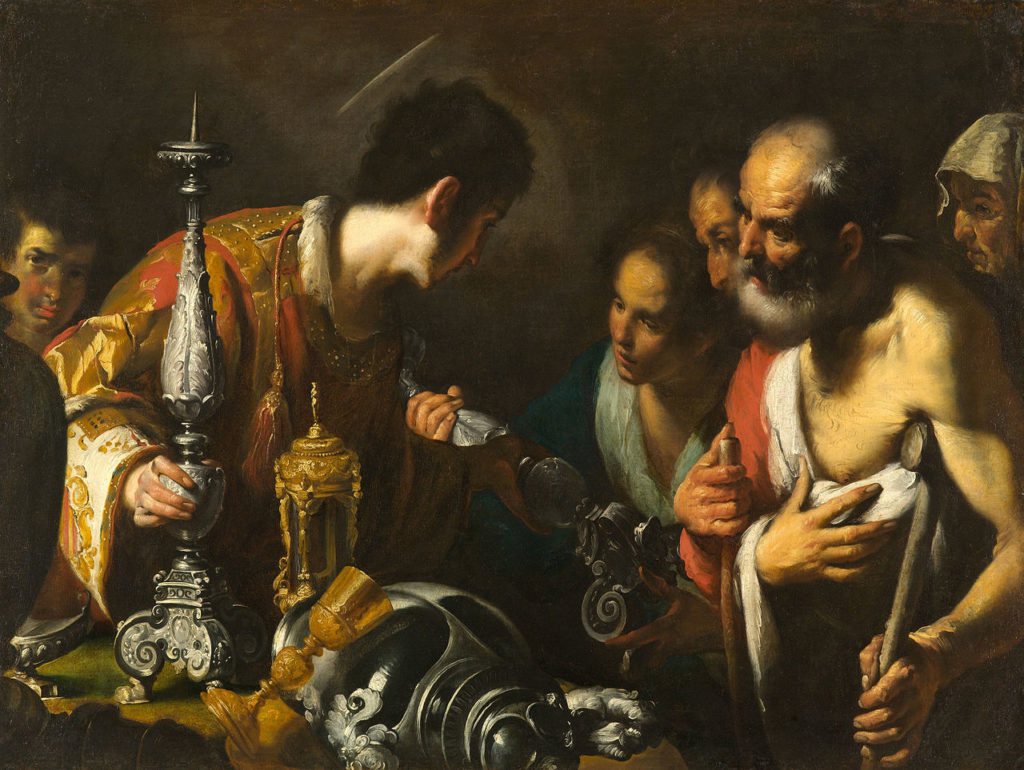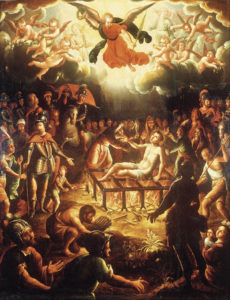Homily on the Feast of St. Lawrence, by Pope St. Leo the Great
The following is a homily given in the mid-fifth century by Pope St. Leo the Great. As Father Lasance notes, Lawrence was so dearly venerated in Rome that his feast was one of the greatest saints’ days in the ancient Roman liturgy, second only to that of Ss. Peter and Paul.
Dearly beloved,
The height of all virtues and the fullness of all righteousness is born of the love of God and one’s neighbor, but surely in none is this love found more conspicuous and brighter than in the blessed martyrs. They are as near to our Lord Jesus, Who died for all men, in the imitation of His love, as in the likeness of their suffering.
The Love whereby the Lord has redeemed us cannot be equaled by any man’s kindness: because it is one thing that a man who is doomed to die one day should die for a righteous man, and another that One Who is free from the debt of sin should lay down His life for the wicked.
Yet the martyrs also have done great service to all men. The Lord Who gave them boldness, has used it to show that the penalty of death and the pain of the cross need not be terrible to any of His followers, but might be imitated by many of them.
If therefore no good man is good for himself alone, and no wise man’s wisdom befriends himself only, and the nature of true virtue is such that it leads many away from the dark error on which its light is shed, no model is more useful in teaching God’s people than that of the martyrs.
Eloquence may make intercession easy. Reasoning may effectually persuade. But examples are stronger than words, and there is more teaching in practice than in precept.
 And how gloriously strong in this most excellent manner of doctrine the blessed martyr Lawrence is, by whose sufferings today is marked! Even his persecutors were able to see it, when they found that his wondrous courage, born principally of love for Christ, not only did not yield, but also strengthened others by the example of his endurance.
And how gloriously strong in this most excellent manner of doctrine the blessed martyr Lawrence is, by whose sufferings today is marked! Even his persecutors were able to see it, when they found that his wondrous courage, born principally of love for Christ, not only did not yield, but also strengthened others by the example of his endurance.
For when the fury of the gentile potentates was raging against Christ’s most chosen members, attacking those especially who were of priestly rank, the wicked persecutor’s wrath was vented on Lawrence the deacon, who was pre-eminent not only in the performance of the sacred rites, but also in the management of the church’s property. The persecutor promised himself double spoils from one man’s capture: for if he forced Lawrence to surrender the sacred treasures, he would also drive him out of the pale of true religion.
So this man, greedy of money and a foe to the truth, armed himself with two weapons: avarice to plunder the gold, and impiety to carry off Christ. He demanded the guileless guardian of the sanctuary to bring him the church’s wealth, on which his greedy mind was set.
But the holy deacon showed him where he had them stored: he pointed to the many troops of poor saints.
Feeding and clothing them was a store of riches which he could not lose, and which were all the more safe since the money had been spent on so holy a cause.

At this, the baffled plunderer became agitated. Blazing out into hatred of a religion, which had put riches to such a use, and as he could find no solid hoard of money in the saint’s possession, he determined to pillage a still greater treasure by carrying off that sacred deposit wherewith Lawrence was enriched.
He ordered Lawrence to renounce Christ, and prepared to ply the deacon’s stout courage with frightful tortures. When the first tortures elicited nothing, fiercer ones followed. Lawrence’s limbs, torn and mangled by many cutting blows, were commanded to be broiled upon the fire in an iron framework, which was already hot enough to burn him, and on which his limbs were turned from time to time, to make the torment fiercer, and the death more lingering.

You gain nothing, you prevail nothing, o savage cruelty! Lawrence’s mortal frame is released from your devices, and, when he departs to heaven, you are vanquished.
The flame of Christ’s love could not be overcome by your flames, and the fire which burnt outside was less keen than that which blazed within!
You but served the martyr in your rage, O persecutor: you but swelled the reward in adding to the pain. For what did your cunning devise, which did not redound to the conqueror’s glory, when even the instruments of torture were counted as part of the triumph?
Let us rejoice, then, dearly-beloved, with spiritual joy! Let us make our boast over the happy end of this illustrious man in the Lord, Who is wonderful in His saints. In him the Lord has given us a support and an example, and has so spread abroad his glory throughout the world, that, from the rising of the sun to its going down, the brightness of his deacon’s light does shine.
And Rome has become as famous in Lawrence as Jerusalem was ennobled by Stephen.
Because, as the Apostle says, all who wish to live holy lives in Christ suffer persecution, by his prayer and intercession we trust at all times to be assisted. And may we be strengthened with the spirit of love and be fortified to overcome all temptations by the perseverance of steadfast faith.
August 10, 2021








